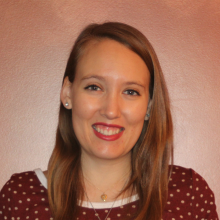April 2020 Spotlight on SRCD U.S. State Policy Fellow: Claudia Kruzik
Claudia Kruzik is a SRCD State Policy Pre-doctoral Fellow who is placed in the Massachusetts Department of Early Education and Care
I am currently in my fourth year of the Applied Developmental and Educational Psychology doctoral program in the Lynch School of Education and Human Development at Boston College. My research interests lie at the intersection of early home, school, neighborhood, and policy contexts and child development. Having a deep interest in early education contexts but a limited view of the policy landscape within which such programs function, the SRCD State Policy Predoctoral Fellowship seemed to be a natural next step in my professional development.
Through the fellowship, I am currently placed in the Department of Early Education and Care (EEC) in Massachusetts. EEC is the branch of the Executive Office of Education which oversees all private early care settings as well as wrap-around care. It plays a variety of functions including overseeing program licensing, the state’s subsidy system, the state’s Quality Ratings Improvement System (QRIS), and overseeing various other grants and initiatives aimed at enhancing access and quality of early education and care in the state. My fellowship placement is housed within the programs division of the department which oversees a variety of projects including grant management, program quality improvement initiatives, family and community support, and workforce development.
Over the course of my fellowship year, I have had the pleasure of being involved in the department’s ongoing revision of the QRIS. EEC has undertaken continuing efforts to develop a system for improving program quality which reduces provider burden and increases providers’ ability to authentically engage in continuous quality improvement. I have taken on an active role in the curriculum domain of the new QRIS by developing rubrics for assessing high quality curricula used with toddlers and infants. I have spent time reviewing evidence and best practice related to the essential practices supporting early development and translating this research into concrete, key indicators and guidelines for practitioners. These rubrics will ultimately play a role in identifying high quality curricula and act as a guide for provider decision making in this arena.
Additionally, I have had the opportunity to employ my analytic skills to enhance internal knowledge of provider costs. This work started as a function of my involvement with the Community Public Partnership Initiative (CPPI) grant, which is a state grant supporting grantee communities to improve preschool access and quality through local public-private partnerships. In the fall, I began developing a cost report detailing descriptive information related to CPPI grantee spending which involved collecting data from grantees, analyzing data to get a descriptive sense of program costs within and across communities, and presenting data in a way that would be accessible for both internal use and use among grantees. The scope of this project expanded and evolved to include a deeper dive into publicly available reports of program costs across the state to get a better sense of costs in different regions and program types. Insights from both parts of this work were ultimately used to inform contracted work related to current, departmental strategic planning efforts.
As I reflect back on the first half of my fellowship year, I am struck by the diversity of learning experiences I have had the opportunity to engage in and the resulting range of knowledge and skills I have gained. I have had the opportunity to utilize my research skills in service of department initiatives, while honing skills in translating research for practical purposes and communicating research to a range of audiences. Thus far, I have come away with a better understanding of the public policy landscape and the key roles academic and private partners play in public work through research and evaluation. Further, in light of the on-going pandemic, I have had the opportunity to see the best of public service as the EEC team came together in quick, fierce, and unyielding support of children, families, providers, and each other. I am happy to have played my small role in keeping EEC initiatives moving forward even in the midst of departmental shifts and emergency efforts and am excited to continue to grow and learn while contributing to ongoing departmental work in the coming months.
